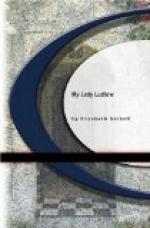time immemorial, the magnificent and fierce Hanbury
wolf-hounds, which were extinct in every other part
of the island, had been and still were kept chained
in the front quadrangle, where they bayed through
a great part of the day and night and were always
ready with their deep, savage growl at the sight of
every person and thing, excepting the man who fed
them, my lady’s carriage and four, and my lady
herself. It was pretty to see her small figure
go up to the great, crouching brutes thumping the
flags with their heavy, wagging tails, and slobbering
in an ecstacy of delight, at her light approach and
soft caress. She had no fear of them; but she
was a Hanbury born, and the tale went, that they and
their kind knew all Hanburys instantly, and acknowledged
their supremacy, ever since the ancestors of the breed
had been brought from the East by the great Sir Urian
Hanbury, who lay with his legs crossed on the altar-tomb
in the church. Moreover, it was reported that,
not fifty years before, one of these dogs had eaten
up a child, which had inadvertently strayed within
reach of its chain. So you may imagine how most
people preferred the terrace-door. Mr. Gray did
not seem to care for the dogs. It might be absence
of mind, for I have heard of his starting away from
their sudden spring when he had unwittingly walked
within reach of their chains: but it could hardly
have been absence of mind, when one day he went right
up to one of them, and patted him in the most friendly
manner, the dog meanwhile looking pleased, and affably
wagging his tail, just as if Mr. Gray had been a Hanbury.
We were all very much puzzled by this, and to this
day I have not been able to account for it.
But now let us go back to the terrace-door, and the
footman sitting in the antechamber.
One morning we heard a parleying, which rose to such
a vehemence, and lasted for so long, that my lady
had to ring her hand-bell twice before the footman
heard it.
“What is the matter, John?” asked she,
when he entered,
“A little boy, my lady, who says he comes from
Mr. Horner, and must see your ladyship. Impudent
little lad!” (This last to himself.)
“What does he want?”
“That’s just what I have asked him, my
lady, but he won’t tell me, please your ladyship.”
“It is, probably, some message from Mr. Horner,”
said Lady Ludlow, with just a shade of annoyance in
her manner; for it was against all etiquette to send
a message to her, and by such a messenger too!
“No! please your ladyship, I asked him if he
had any message, and he said no, he had none; but
he must see your ladyship for all that.”
“You had better show him in then, without more
words,” said her ladyship, quietly, but still,
as I have said, rather annoyed.




